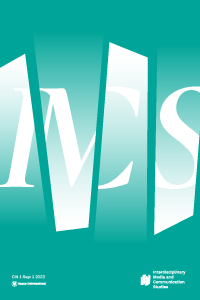Öz
Current U.S. newspaper coverage of the conflict between Israel and Gaza perpetuates a pattern of foregrounding and privileging Israeli interests and lives over those of Palestinians. This skew in coverage has been documented in mainstream U.S. media for decades. New is how such pro-Israeli war journalism or “textbook coloniser journalism” infiltrates coverage of seemingly unrelated topics, hinders informed and complicated public discussion, and fuels increased racist attacks and polarization in the United States. Such bias is the antithesis of ethical reporting and contributes to global enmity that feeds violent conflict.
Anahtar Kelimeler
free speech/press war/peace journalism media ethics feminism democracy
Destekleyen Kurum
Washington State University
Kaynakça
- Anderson, N. (2023, December 5). Lawmakers question Harvard, Penn, and MIT presidents on antisemitism. The Washington Post.
- "College presidents under fire after dodging questions" (2023, December 6). The New York Times.
- "University leaders hammered after congressional hearing" (2023, December 7). Axios.
- "US university presidents face firestorm over ‘evasive’ answers on antisemitism" (2023, December 7). The Guardian.
- "White House – But not Biden – Rips University Presidents" (2023, December 6). The New York Post.
- "White House blasts university presidents" (2023, December 6). The Daily Beast.
- "White House, lawmakers criticize university leaders" (2023, December 6). The Washington Post.
- Hicks, M. (2024, January 10). MIT’s president is still standing. Chronicle of Higher Education.
- Johnson, A. (2024, January 9). Coverage of Gaza War in New York Times and other major newspapers heavily favored Israel, analysis shows. The Intercept.
- Kekauoha, A. (2023, December 6). Navigating the fog of war: Stanford’s discussion on media coverage of the Israel-Hamas war. Stanford Report.
- Krishnan, V. (2024, February 2). Opinion: Western coverage of Gaza: A textbook case of coloniser’s journalism. Al Jazeera.
- Levy, M. (2023, December 9). Penn President resigns after antisemitism criticism. AP News.
- Natanson, H. (2023, December 15). Criticism of Harvard’s president is growing. Some see race as a factor. The Washington Post.
- PBS. (n.d.). "‘Have You No Decency?’ McCarthy: American Experience" [Video]. YouTube. https://www.youtube.com/watch?v=svUyYzzv6VI
- Ross, S. D. (2003). Framing of the Palestinian/Israeli conflict in thirteen months of New York Times editorials surrounding the attacks of Sept. 11, 2001. Conflict & Communication, 2(2).
- Ross, S. D. (2006). (De)constructing conflict: A focused review of war and peace journalism. Conflict & Communication, 5(2).
- Stripling, J., et al. (2023, December 10). Penn President Liz Magill resigns after antisemitism criticism. The Washington Post.
Öz
Current U.S. newspaper coverage of the conflict between Israel and Gaza perpetuates a pattern of foregrounding and privileging Israeli interests and lives over those of Palestinians. This skew in coverage has been documented in mainstream U.S. media for decades. New is how such pro-Israeli war journalism or “textbook coloniser journalism” infiltrates coverage of seemingly unrelated topics, hinders informed and complicated public discussion, and fuels increased racist attacks and polarization in the United States. Such bias is the antithesis of ethical reporting and contributes to global enmity that feeds violent conflict.
Anahtar Kelimeler
free speech/press war/peace journalism media ethics feminism democracy
Kaynakça
- Anderson, N. (2023, December 5). Lawmakers question Harvard, Penn, and MIT presidents on antisemitism. The Washington Post.
- "College presidents under fire after dodging questions" (2023, December 6). The New York Times.
- "University leaders hammered after congressional hearing" (2023, December 7). Axios.
- "US university presidents face firestorm over ‘evasive’ answers on antisemitism" (2023, December 7). The Guardian.
- "White House – But not Biden – Rips University Presidents" (2023, December 6). The New York Post.
- "White House blasts university presidents" (2023, December 6). The Daily Beast.
- "White House, lawmakers criticize university leaders" (2023, December 6). The Washington Post.
- Hicks, M. (2024, January 10). MIT’s president is still standing. Chronicle of Higher Education.
- Johnson, A. (2024, January 9). Coverage of Gaza War in New York Times and other major newspapers heavily favored Israel, analysis shows. The Intercept.
- Kekauoha, A. (2023, December 6). Navigating the fog of war: Stanford’s discussion on media coverage of the Israel-Hamas war. Stanford Report.
- Krishnan, V. (2024, February 2). Opinion: Western coverage of Gaza: A textbook case of coloniser’s journalism. Al Jazeera.
- Levy, M. (2023, December 9). Penn President resigns after antisemitism criticism. AP News.
- Natanson, H. (2023, December 15). Criticism of Harvard’s president is growing. Some see race as a factor. The Washington Post.
- PBS. (n.d.). "‘Have You No Decency?’ McCarthy: American Experience" [Video]. YouTube. https://www.youtube.com/watch?v=svUyYzzv6VI
- Ross, S. D. (2003). Framing of the Palestinian/Israeli conflict in thirteen months of New York Times editorials surrounding the attacks of Sept. 11, 2001. Conflict & Communication, 2(2).
- Ross, S. D. (2006). (De)constructing conflict: A focused review of war and peace journalism. Conflict & Communication, 5(2).
- Stripling, J., et al. (2023, December 10). Penn President Liz Magill resigns after antisemitism criticism. The Washington Post.
Ayrıntılar
| Birincil Dil | İngilizce |
|---|---|
| Konular | Kitle İletişimi |
| Bölüm | Düşünce Yazısı |
| Yazarlar | |
| Yayımlanma Tarihi | 31 Mayıs 2024 |
| Gönderilme Tarihi | 8 Mart 2024 |
| Kabul Tarihi | 16 Nisan 2024 |
| Yayımlandığı Sayı | Yıl 2024 Cilt: 1 Sayı: 1 |
Açık Erişim
İnterdisipliner Medya ve İletişim Çalışmaları Dergisi açık yayıncılık ilkesine bağlıdır. Her makaleye yayımlanma tarihinden itibaren derginin internet sayfası üzerinden hiçbir bir kısıtlama ve gecikme olmaksızın tam metin olarak erişilebilir.

